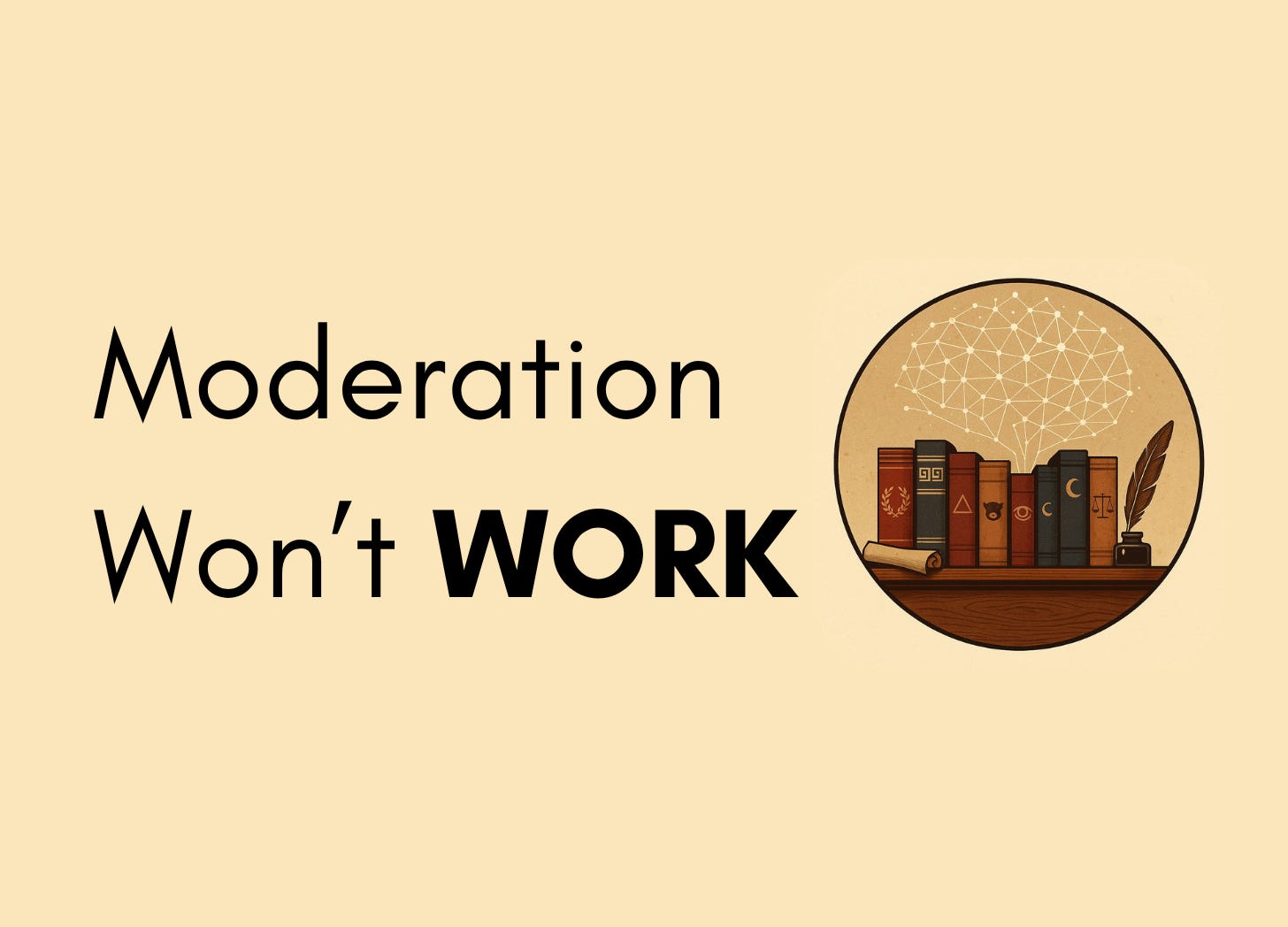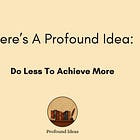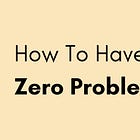Work-Life Balance is Bullsh*t (Do This Instead)
Modern Moderation Is Failing
The Illogical Work-Life Balance
Moderation is the silken string running through the pearl chain of all virtues.
Joseph Hall
Building a balanced life is hard, but not for the seemingly obvious reasons.
Most people don't actually know what a balanced life is.
Whenever I ask people I know what balance means, in general terms, they always mention the idea of having a work-life balance.
I've heard a lot of different viewpoints on the so-called "work-life balance." Most people I've spoken to about the topic of balance, in life, view it as a duality; you're either working or not working.
But this perspective poses a lot of questions, the key one being this: work is a hard word to define.
How can you build a balanced life, if you don't even know what living a life actually is?
One Man's Trash = Another Man's Treasure
I love picking up a book, especially after learning how to build real habits with one of my previous newsletters:
The thought of spending the entire day in a bookstore, wandering around the classics section; it genuinely puts a tear in my eye. This is my favorite way to spend any weekend without question.
But for anyone else I know who comes within 50 feet of my kindle? The boredom kicks in, the tears begin to flow; I can feel the angst, almost smell it. Straight away I hear the words, phrased in one way or another:
"You wouldn't catch me dead reading a book. I f*cking hate reading."
For me, reading is a joyful experience; the honest, deliberate search for knowledge and truth. It overrides my conscious facilities and gets me into a state of flow and deep focus.
For others, reading is boring as hell. In other words, it is their version of "work."
The common definition of work said by most people is unpractical.
Here's What Work Really Is
Work is living.
That's it.
They're practically the same thing. Experiencing what it means to be human, alive, on this planet, is to become subject to all things.
The good and the bad. There is no virtue without evil, and there are no individual sources for pleasure without individual sources for pain.
By looking at all things you do in life as "living," along with 2300 year old wisdom from Greek philosophy, you can take control of how you live your life. Balance will soon cover all aspects of what you do; it won't be limited to either work or play.
If the "balanced life" is thus broad by definition, covering all things enjoyable and painful from work and play, then the solution must be broad too, right?
This is dead wrong.
This is because generic advice fails to take the individual into account.
In this newsletter, I will show you how to actually build a balanced life for you and your needs, and how to create real habits that will get you there.
The source of all sustainable habits come from understanding your own unique personal limits. If you don't understand yourself, you'll always fall short in trying to help yourself. You need to set yourself up for success by understanding who it is that you are. This newsletter will help with that.
By knowing and working below your limits, and by having a clear vision of what a balanced life looks like for you, you'll no longer be walking around in the dark trying to hit a target you cannot see.
Remember: life is just habits. Let's learn how to build them the right way.
Why Modern Moderation Fails
The secret of success is moderation; not too little, not too much. Neither deficiency nor excess.
Confucius
"You just need more balance."
Easy to say without considering the notion of having to (potentially) work a 9-5 job, waking up after having hit the snooze button for the sixth time in a row, doom-scrolling on social media for five hours a day, commuting to a job that you don't like, doing meaningless work for a boss you hate, all while having a burning desire in your heart to change it all.
Who are we speaking to here exactly? The 20-something year old male who's miserable, suffering, and now obsessed with self improvement? What about a student, an adolescent, an 8 year old child?
What about the stages of life. Parents or people with no children? Married or single? What if you're in the middle of a career change, or moving home? Going through an intense breakup? Don't even mention the idea of having an illness.
Yes, "all you need is a bit more balance!"
Problems are universal and apply to everyone, at every age, at every given second.
No two people are the same; no two problems are the same, and no two solutions are going to be the same either.
Generic self-help advice is not suitable for most people to hear, let alone consider. It doesn't account for people's unique lives, personal limits, and responsibilities. Thus, the search for balance ends up leaving most people feeling full of despair.
I think back to when I was in college, having my lecturers telling me I should be treating my college degree as my life's biggest priority. I should put aside all other things like hobbies, passions, sports, and part-time jobs (that get me onto the bus to go into college in the first place).
There's more to life than just college.
There's more to life than just work, education, self-maintenance.
Your life is the culmination of your habits that are working within a series of domains. But no two things are the same. A study plan is going to look far different than a marathon training plan.
Time blocking, the 80/20 rule, deep work; these are very popular frameworks for cultivating balance and they do work. But they aren't suited to all endeavors like the one I'm proposing, and they need to be adjusted.
Thus, balance must be domain specific.
Choose Your Domains
The man who pursues moral excellence in all things will have a suitable reserve; he will tend to be moderate in attitude and action.
Aristotle
What are some of the key domains that make up most people's lives?
What areas do people put their energy into the most?
This is life:
Job/Career
Means of Education
Intimate Relationship
Family/Friends
Physical Health
Mental Health
Hobbies/Passions
Creative Outlet
These domains are broad and they aren't all necessary to have. You should be aiming for most of them, at least. If not, you're probably asking for a terrible life.
When it comes to finding balance in your life, that's literally it; you need to find it.
You must define your domains of life and see what your true limits are. Then, once you've found your optimal point of efficiency for each domain, consider all other domains in relation to one another (this is very important), you'll be able to thrive towards and achieve multiple goals.
If you don't know what your domains are, then you won't know how you're spending your life. You need to understand how you're living, and what you're currently living towards, in order to change it.
Let's use this as our example for a few selected domains:
Bachelors degree (full time)
Part time job (20 hours weekly)
Gym
Journaling
Learn a language
These might not constitute your entire life, but that's not the point here. What you're doing is listing out your priorities. This is just a start.
You must ruthlessly prioritize minimal needs.
If you have less goals, you can increase the quality of your pursuit towards very few goals. There's no point spreading yourself so thin that you're doing no high quality work or making any real, distinct change in your life. Big change comes from high quality work done consistently towards a clear, intended purpose. Let's focus on just five domains for now, the absolute bare necessities.
Find Your Limits
Aristotle knew how to live a balanced life (in theory).
The Golden Mean is a concept not spoken about enough. It's the perfect point of balance, where virtue lies, between two ends - excess and deficiency. It's a hard target to aim at, and it's not an easy one to define. It's just like trying to define a balanced life.
Thinking of and then attempting to implement a habit is not easy. Not for anyone. It takes a great amount of self-understanding. You need to know exactly who you're working with here. Negotiating with yourself is not an option. It's vital to your survival.
You cannot work at 200% intensity every single day for a year. If 100% is the limit, what do you expect to come from over-exceeding it?
More fuel consumed, more recovery needed, more wasted time spent in burnout.
In order to work, or more precisely, to live, optimally across a long period of time, a life, let's say, you need to work close to, while never actually exceeding, your limits.
If you can read 40 pages a day for 3 days in a row, but need 4 days to mentally recover, a week for you working within that specific domain would look like this:
Weekly = 120 pages
Yearly = 6240 pages read, or roughly 20 books a year
Now imagine if you backed off, understanding that your daily limit lies somewhere in between 15-25 pages a day.
Weekly = 140 pages
Yearly = 7280 pages, or roughly 24 books per year
Burnout wastes a lot of time. You don't need to be working as hard as you think you need to. Small efforts done consistently add up in the long run, and prevent time wasted from feeling burnt out, leaving you with more opportunity to make progress towards the goals you want to achieve.
How To Build A Balanced Life in 5 Steps
The man who makes everything that leads to happiness depends upon himself, and not upon other men, has adopted the very best plan for living happily. This is the man of moderation.
Plato
The balanced life is your life, not anyone else's. You set the standards. The plan is built by you, for you. The hope is to not override yourself with menial, responsibility tasks, or just play and pleasure 24/7.
The good life needs both in order to be experienced fully - there is a balance to be found.
Aristotle believed that self-understanding is the source of all wisdom. Set yourself up for success by negotiating with yourself. Understand your needs and go fulfil them.
Here's how:
Step 1: Reset To Find The Truth
Hit the reset button on your life right now.
You might be living sub-optimally with your current habits. The goal of this reset is to understand your minimum effective dose, your unique baseline for all of your habits.
You're going to pick your domains and do the least amount of productive work that is needed. But before you do this, you need to forget about how you live and view your life right now.
I used to do jiu jitsu 4 times a week.
I used to read for 5 hours a week.
I used to do college work for 6 hours a day.
Once I did a critical analysis on how I was living, a hard reset, I realized the following: I was tricking myself.
The work I thought I was doing was not lining up with how I was living in reality.
Here's the truth:
I was actually averaging about 2 jiu jitsu sessions a week, not 4
I would read for about 2 hours a week at best, not 5
I was barely doing 30 minutes of actual, productive work in all of my study sessions. Where was I getting 6 from?
I gained this raw data by observing myself. Self-understanding revealed to me my flaws. And the ultimate way to learn these truths?
I looked at my calendar.
It shocked me as to how much I thought I was doing, versus actually seeing how I was behaving in reality. Thus, the importance of a reset was absolutely necessary in learning to let go of my assumptions I had about myself.
Time to find my real limits.
Step 2: Pick Your Minimal Goals
You can always see more clearly once you’ve done a reset.
Your next available opportunity, an empty calendar before you. It could be the start of a new week, or it could be tomorrow.
Time to define what’s important to you with ruthless prioritization (I wrote about this in last weeks newsletter:
Pick 3-5 domains. That’s it. This is just as a start right now, you add more goals when you're capable.
These are your life responsibilities, the domains that, to you, will bring about the most positive change for you and your life as quickly as possible. Less is more here.
Step 3: Define Your Unique Golden Mean For Each Domain
This will be your guiding principle:
What can I do within each domain, consistently and efficiently, every single week for an entire year without fail?
Find your Golden Mean. What is your point of sustainability?
Start as low as humanely possible. Aim so low that you know success will be inevitable. Make failure become an impossibility.
One page.
One rep.
Wake up one minute earlier.
The goal is to build a system that you can stick to for life; progress means nothing at the start. It's all about understanding and defining your real limits.
Focus on hitting your weekly targets consistently before trying to make progress, or trying to increase the intensity.
You'll never make progress if you can't stick to a habit.
Step 4: Think Weeks, Not Days
A week allows for more adaptability than the day. You can give yourself a target, and allow yourself the whole week to hit it. 1,000 words, 2 chapters understood and applied to my life, or 2 gym sessions across the week.
Most people think and work in terms of a repeatable seven day pattern. Monday serves as a collective reset for most people.
Define your targets and schedule when to work towards them based on your life.
Step 5: Adjust, Adapt, and Listen To Yourself
Adjust your Golden Mean definitions from week to week. See what worked, what didn't.
Too much or too little? Did you find your Goldilocks zone?
Maybe writing for 90 minutes a day was perfect for you. But you struggled to hit your learning goals. Maybe you’d need to decrease the amount of time you spent writing to account for your studying goal you wish to work towards.
Goals within the same domains can cause overlap and affect other habits; think physical and mental. Lifting weights and doing jiu-jitsu is going to need some consideration with regards to your body’s recovering needs. The same applies to any sort of intellectual work such as reading, writing, intense studying, or any type of creative outlet.
You have finite energy within your domains. Don’t spread yourself too thin.
Your first few weeks should be so easy to achieve that it should be laughable. Hitting your targets should be piss easy.
But it's still progress, although small, AND you managed to maintain the habit consistently.
Focus on creating a system that works for you, and you'll never feel like you have to work for it.
A Solution To Save Efforts
Building habits is hard.
Most people do it wrong, and fail again and again.
I wanted to create a fully-fledged eBook that helps people to properly understand and gain clarity on their personal limits - defining their own unique Golden Mean definitions across all domains.
Generic self-help advice is too vague. It never considers the individual’s needs.
The Golden Habit System, using Aristotle’s Golden Mean concept, helps you to create your own customised habit plans suited to you and your own needs with a thorough, AI prompt that’s 3 pages long.
It’s not like most vague prompts. It’s been made for a distinct purpose: to help you understand yourself, and to help you build as many habits as you want.
One detailed AI prompt. Unlimited habits plans for you to make. All personalized to you.
Click here to take a look at The Golden Habit System eBook.
I hope that with this letter, I’ve given you some practical wisdom to help build a balanced life. It's obviously going to change from week to week. Life is chaotic. You never know what's going to show itself involuntarily. All you can do is adjust your expectations, and focus on making some progress rather than none.
The balanced life really is a profound idea.
Thank you for reading.
- Profound Ideas






amazing post brother